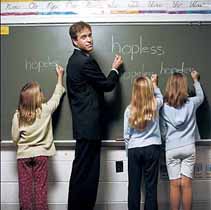This page was last updated on: February 23, 2005
LANGUAGE DEVELOPMENT IN THE SCHOOL YEARS

Photo by D.A. Peterson
Literacy
Stages: Learning to Read (Coltheart and Harris (1986)
1. Sight vocabuluary (whole word)
2. Discrimination net. May base judgement on: word length being similar to a word they already know
e.g. 'television' = 'children' or focus on a single letter e.g. read 'black' for words ending in 'k'
3. Phonic. Extensive use of letter to sound correspondences
4. Orthographic. Necessary to distinguish pairs like 'pint' and 'mint'
Stages: Learning to Spell/Write (Coltheart and Harris (1986)
1. 'squiggles'
2. phonological segmentation, e.g. the phonology is correct but the orthography is incorrect, e.g.
temprecher (temperature), qwicer (quicker), harf (half), sine (sign), triped (tripped)
3. orthographic, grasp of the orthographic conventions and ability, e.g.
fox vs. cough vs. Philip where 3 segments in bold realize /f/
Note the difficulties of the English orthographic system. In a study across 15 European countries, Philip Seymour of the University of Dundee found that on average, English speakers took 2 and a half times longer to acquire basic elements of literacy than speakers of other European languages.
Acquisition of literacy leads to more advanced linguistic and metalinguistic development because the printed word 'holds the language still' and allows contemplation and analysis.
Further Reading
Ely, R. (2000) 'Language and literacy in the school years' in J. Gleason (ed), The Development of
Language 5th edition.
Perera, K. (1984) Children's Writing and Reading: Analysing Classroom Language.
Campbell, R. (1999) Literacy from Home to School: Reading with Alice
Kress, G. (1994) Learning to Write 2nd Edition
Harris, M and Coltheart, M. (1986) Language Processing in Children and Adults
Olsen, D. (1977) 'The formalization of linguistic rules' in J. MacNamara (ed.), Language, Learning and
Thought
General Discourse Skills
The school years build on children's abilities to initiate conversational topics and to keep them going successfully. Much of this depends on increasing ability to make their discourse both more coherent and more cohesive. They also make progress in politeness and how to negotiate ideas and actions through conversation.
Further Reading
Sinclair, J. and Coulthard, M. (1975) Towards an Analysis of Discourse: the English Used by Teachers
and Pupils
Ervin-Tripp, S. (1977) 'Wait for me, roller skate!' in S. Ervin-Tripp and M. Keenan (eds), Child Discourse
Ely, R. (2000) 'Language and literacy in the school years' in J. Gleason (ed), The Development of
Language 5th edition.
Mercer, N. (2000) Words and Minds: How we use language to think together
English as a New Language
For many children the school years will demand the mastery of a new language.
A new language links us to a new culture and often to different ways of viewing the world.
Further Reading
Harding, E. and Riley, P. (1999) The bilingual family
Grosjean, F. (1982) Life with Two Languages
Bialystok, E. (ed) (1991) Language processing in bilingual children
Romaine, S. (1995) Bilingualism 2nd Edition, Oxford: Blackwell
Acquisition of Style and Register
Children need to acquire the basics of the written language register which shows key differences from the spoken register. Key aspects of the written register:
- Requires more explicit reference due to lack of context.
- Is sentence based rather than utterance based
Children also acquire the ability to recognize and use more specialized registers, e.g. registers based on gender and occupation and classroom discourse registers.
Further Reading
Willes, M. (1981) 'Learning to take part in classroom interaction' in P. French and M. Maclure (eds)
Adult-Child Conversations
Wheeler, R. and Swords, R. (2004) 'Codeswitching: Tools of language and culture transform the
dialectally diverse classroom', Language Arts, Volume 81, Number 6.
Edelsky, C. (1977) 'Learning what it means to talk like a lady' in S. Ervin-Tripp & C. Mitchel-Kernan,
(eds) Child Discourse
Slosberg Andersen, E. (1990) Speaking with Style: The Sociolinguistic Skills of Children
Selected Press Articles
Further Bibliography
Abudarham, S. (1982) 'Communication problems of children with dual-language systems or backgrounds: to teach or to 'therapize'?' reprinted in E. Murphy (ed) (2003) The International Schools Journal Compendium Volume 1: ESL
Anderson, R., Wilson, P and Fielding, L. (1988) 'Growth in Reading and How Children Spend Their Time Outside of School' Reading Research Quarterly 23: 285-303.
Bialystok, E. (1997) 'Effects of bilingualism and biliteracy on children's emerging concepts of print',
Developmental Psychology, 33: 429-440.
Developmental Psychology, 33: 429-440.
Bickerts, S. (1998) 'Into the Electronic Millennium' in V. Clark, P. Eschholz and A. Rosa (eds)
Language: Readings in Language and Culture 6th Edition
Language: Readings in Language and Culture 6th Edition
Coates, J. (2004) Women, Men and Language: A Sociolinguistic Account of Gender Differences in Language 3rd Edition
Cronin, V. (2002) 'The syntagmatic-paradigmatic shift and reading development', Journal of Child Language, 29 (1): 189-204.
Cummins, J. (1978) 'Bilingualism and the development of metalinguistic awareness', Journal of Cross Cultural Psychology, 9.
Gentry, J. and Gillet, J. (1993) Teaching kids to spell
Goswami, U. (2000) 'How to beat dyslexia', The Psychologist, Vol. 16 No. 9:
Gumperz, J. (ed.) (1982) Language and Social Identity, Cambridge: Cambridge University Press.
Hall, N. (1999) 'Children's Use of Graphic Punctuation', Language and Education, Vol. 13, No. 3.
Heath, S. (1983) Ways with Words: Language, life and work in communities and classrooms
Ho, C. and Bryant, P. (1997) 'Phonological skills are important in learning to read Chinese', Developmental Psychology, 33
Jørgenson, J. N. (1998) 'Children's Acquisition of Code-Switching for Power-Wielding', in P. Auer (ed.)
Code-Switching in Conversation: Language, Interaction and Identity
Code-Switching in Conversation: Language, Interaction and Identity
Kroll, B. (1981) 'Developmental relationships between speaking and writing' in B. Kroll and R. Vann (eds), Exploring speaking and writing relationships
Oakhill J. and Beard, R. (1999) Reading Development and the Teaching of Reading: A Psychological Perspective
Read, C. (1986) 'Creative spelling by young children' in T. Shopen and J. Williams (eds) Standards and Dialects in English
Seymour, P., Aro, M. and Erskine, J. (2003) 'Foundation literacy acquisition in European orthographies', British Journal of Psychology, 94
Snowling, M. (2000) Dyslexia 2nd Edition